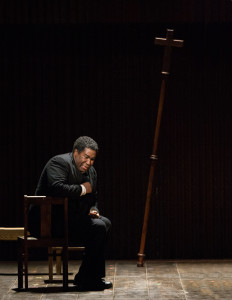VIEWPOINTS – As an opera, Kurt Weill’s flawed and dated LOST IN THE STARS was ahead of its time
- By drediman
- February 20, 2016
- No Comments
 What is opera vis-à-vis musical theater? Which form is more on the cutting edge of serious music theater? Is there even a difference between them? Famed German American composer Kurt Weill didn’t think so. According Weill, “if there will ever be anything like an American opera, it is bound to come out of Broadway. I’m in favor of the Metropolitan – as a museum – but not to start a movement of American musical theater.” Deeply impressed by American masterworks like the Gershwins’ Porgy and Bess, which premiered on Broadway and is now a cornerstone of American opera, Weill was determined to blur the lines between opera and musical theater. He went on to write such hybrid classics as The Threepenny Opera, Street Scene, and Lost in the Stars. The last of these can be currently seen in a Washington National Opera revival at the Kennedy Center.
What is opera vis-à-vis musical theater? Which form is more on the cutting edge of serious music theater? Is there even a difference between them? Famed German American composer Kurt Weill didn’t think so. According Weill, “if there will ever be anything like an American opera, it is bound to come out of Broadway. I’m in favor of the Metropolitan – as a museum – but not to start a movement of American musical theater.” Deeply impressed by American masterworks like the Gershwins’ Porgy and Bess, which premiered on Broadway and is now a cornerstone of American opera, Weill was determined to blur the lines between opera and musical theater. He went on to write such hybrid classics as The Threepenny Opera, Street Scene, and Lost in the Stars. The last of these can be currently seen in a Washington National Opera revival at the Kennedy Center.
What makes a piece like Lost in the Stars so ahead of its time as an opera is its openness and willingness to embrace contemporary theater techniques to tell its story. Sound familiar? This is precisely the approach major opera companies like the Met and the Lyric Opera of Chicago are currently using to represent opera to the world – For instance, the mighty Met, under General Director Peter Gelb, has looked outside the opera world to the hottest theater directors and choreographers when replacing its warhorse productions (admittedly to mixed effect). Additionally, the Lyric Opera, in hugely successful effort, is now regularly including musicals in its repertoire (Sweeney Todd, Carousel, The King and I, The Sound of Music, to name a few).
Not that Lost in the Stars is a masterpiece, despite Weill’s accomplished and eclectic score. Far from it – from today’s lens, the opera, itself an adaptation of Alan Paton’s influential novel Cry, the Beloved Country about a South African pastor who struggles through a crisis of faith after his son is sentenced to death for inadvertently killing a white man, is awfully dated. In particular, Maxwell Anderson’s libretto is filled with clunky, cringe-worthy dialogue and simplistic points of views. Luckily, Washington National Opera’s production doesn’t apologize and cover up for the deficiencies of the opera by revising the libretto. Unlike the recent Broadway revival of Porgy and Bess, which was reconfigured by director Diane Paulus for contemporary audiences, Weill and Anderson’s original vision have here been carefully preserved. In my opinion, with the right cast and production, one can forgive a lot of things. In this production of Lost in the Stars, I was ultimately swept by the power of the story and moved by the commitment and fervor the company of actor/singers brought to Weill’s opera, despite of its flaws. Washington National Opera (under the artistic directorship of Francesca Zabello) has also wisely chosen to stage the opera in the more intimate Eisenhower Theater as opposed to the cavernous Opera House at the Kennedy Center. As a result, the production works both as both opera and theater, just as Weill had intended.
Tazewell Thompson’s production, which has traveled to Washington via Cape Town and the Glimmerglass Festival, is efficient and fluid, if lacking a bit in directorial excitement. The cast, which is comprised of both music theater performers and actors (in an interesting decision by the creators, not all the principal characters are scripted to sing), is excellent all-around. In the role of pastor Stephen, the great American bass-baritone Eric Owens is revelation. Vocally, it’s no surprise to report that Mr. Owens sounded glorious, with his rich voice easily reaching the far corners of the relatively intimate Eisenhower. It was his fully invested acting, however, that really moved me and, in my mind, secured the success of Mr. Tazewell’s production (his rendition of the title song closed Act One on a dramatic and musical high). Other standout musical performances include soprano Lauren Michelle’s luxuriously-voiced Irina and tenor Manu Kumasi’s vigorous Leader. Musical theater fans may also recognize Cheryl Freeman in fine voice as the feisty Linda. Under conductor John DeMain’s leadership, the scaled-back Washington National Opera Orchestra did Weill’s score proud.
RECOMMENDED
LOST IN THE STARS
Opera
Washington National Opera at The John F. Kennedy Center for the Performing Arts
2 hours, 40 minutes (with one intermission)
Through February 20

 Copyright © 2024
Copyright © 2024
Leave a Reply